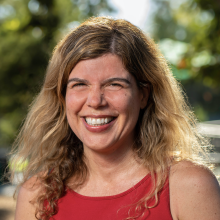Anne Brunet awarded 2022 Lurie Prize in Biomedical Sciences
By Hanae Armitage
Wu Tsai Neurosciences Institute faculty affiliate Anne Brunet, PhD, professor of genetics at Stanford Medicine and the Michele and Timothy Barakett Endowed Professor, has won the 2022 Lurie Prize in Biomedical Sciences for her pioneering research in the mechanisms of aging.
The Lurie Prize, awarded annually for the past 10 years, recognizes researchers who are 52 or younger. The award, which comes with an honorarium of $50,000, will support Brunet’s investigation into age-related diseases and the mystery of why we age.
“It’s exciting to bring different organisms and approaches together to understand aging,” said Brunet. “It’s fascinating to be able to use different strategies — from observational to interventional and mechanistic — to make discoveries on the mechanisms of aging.”
Brunet aims to identify the molecular and cellular mechanisms that convert a young, healthy individual into one who is older, frail and more susceptible to disease. One of her points of interest is the “aging clock,” a compilation of the processes that underlie how the body changes. She and her team are researching how aging can be influenced by environmental stimuli such as diet, sexual interactions and exercise. One of their big questions: Can aspects of aging be slowed or even reversed?
Brunet’s team studies aging in a variety of animals — from roundworms and mice to the African killifish, whose short lifespan and ability to exist in a state called diapause (a form of “suspended animation” like hibernation) make it a prime candidate to reveal basic mechanisms of lifespan and aging.
"When I started my lab at Stanford, focusing on aging, the field was somewhat controversial. Some people viewed aging as just a matter of unavoidable wear and tear, not a process that could be regulated. I thought there was more to uncover."
Read Brunet's Brains Behind the Institute profile>>
She hopes that her research will fuel an understanding of how to delay the diseases of aging.
Brunet shares the award with Andrew Dillin, PhD, a professor of molecular and cell biology at UC-Berkeley.
The Lurie Prize is made possible by a donation to the Foundation for the National Institutes of Health by philanthropist Ann Lurie, president of the Ann and Robert H. Lurie Foundation and of Lurie Holdings Inc.
